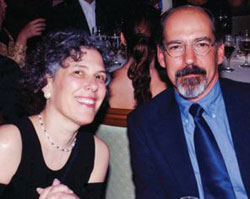Prostate Cancer is Difficult… But Foregoing PSA Testing & Not Knowing? Unbelievable!
by Marcy Manning

After reading information on the URF website, Marcy Manning sent a note to Dr. Catalona about her husband’s experiences with his prostate cancer diagnosis. Dr. Catalona asked if she would be willing to share her thoughts with QUEST readers. She graciously agreed.
I’m writing so other families may be spared our situation.
Because my husband’s doctor didn’t flag rising PSA scores, my husband’s aggressive prostate cancer was diagnosed at Stage 3, even though he’d had regular PSA tests and checkups for years.
In fact, his doctor didn’t refer him to a urologist until his PSA was 7.4.
After research, I put together some information, contrary to common misconceptions, that I wish I’d known before my husband’s diagnosis.
Misconception:
If the PSA is below 4.0, you can’t have prostate cancer. And if your PSA is rising, but below a certain number, you don’t need a biopsy.
Fact:
Men can have prostate cancer at any PSA level. In fact, PSA velocity (how fast PSA scores rise) and free PSA are two helpful diagnostic tools. Also, it’s important to know median PSA scores for age ranges: 0.7 for men in their 40s, 0.9 in their 50s, and 1.3 in their 60s.
My husband’s first PSA score was a 1.9 in his late 40s, 3.03 at age 52 and 4.0 at age 54. Because these scores were always higher than the median, and rising faster than they should have been, he needed immediate diagnostic attention. Unfortunately, it didn’t happen.
Misconception:
Prostate cancer is a slow-growing disease of old men, so men with prostate cancer die “with it, not from it.”
Fact:
As one friend put it, “They’re slowgrowing, except when they’re not.” The National Cancer Institute and the National Institutes of Health estimate 34,000 men will die of prostate cancer in 2011.
Misconception:
Unless your doctor says your PSA is too high, you can relax.
Fact:
My husband’s internist had 5 PSA scores, each one questionable on some level, but only when one became dramatically higher did the doctor refer my husband to a urologist.
The urologist took one look at the scores and said, “It’s time to biopsy.” The ensuing prostatectomy revealed that cancer had broken out of my husband’s prostate in multiple places.
I wish I’d read Dr. Patrick Walsh’s Guide to Surviving Prostate Cancer and Dr. Catalona’s website: www.drcatalona.com much sooner in order to compensate for what we weren’t told.
Misconception:
There’s no difference in outcomes based on when prostate cancer is discovered.
Fact:
The earlier it’s found, the better off one is. If it’s found at a lower PSA score, the cancer is more likely to be fully contained in the prostate and the chances of full cure are greater.
Misconception:
If your doctor says to watch and wait, you’ll be fine as long as you watch faithfully.
Fact:
I would far rather our doctor had said, “Look, this may be overkill, but your PSA score is almost 3 times the median for your age and it’s higher than the median for men 30 years older. I want you to follow up regularly with a urologist.”
We’d all rather not find cancer, but if it’s there, it’s far better to find it early when the prognosis is better and odds of a complete cure are higher.
Misconception:
The treatments for prostate cancer are so horrible that it’s better to forego them.
Fact:
Treatments are constantly being improved. Nerve-sparing prostatectomies by experienced surgeons have revolutionized treatment. And, isn’t living and being with your family more important than anything else?
Misconception:
If you have no symptoms, don’t be concerned about prostate cancer.
Fact:
Many men with prostate cancer have no symptoms until cancer is quite advanced. The PSA test was the only sign my husband had that anything was wrong.
Misconception:
All PSA tests are the same wherever you go.
Fact:
There are two different standards for PSA tests: Hybritech & W.H.O. (World Health Organization). The W.H.O. test reads 23% lower than the Hybritech, and half the 15 million U.S. men who have PSA testing every year have one and half the other.
Misconception:
All urologists and surgeons are equal. All radiation techniques and equipment are equally effective.
Fact:
Even board-certified urologists and radiological oncologists don’t necessarily have the most up-to-date information or most up-to-date equipment.
Two board-certified surgeons didn’t mention adjuvant radiation to us even though it turned out to be recommended for my husband based on the pathology
Patients should get second opinions from experienced prostate cancer specialists at university hospital centers and get statistics on numbers of patients the doctors have treated with each procedure and what the results have been.











